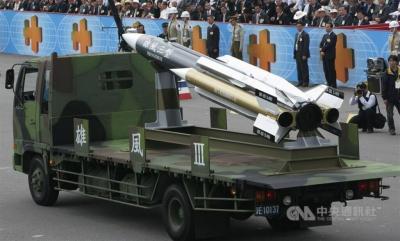The Chinese Nationalist Party’s (KMT) Kaohsiung City Council caucus yesterday said that it would be making a donation to the victims of last week’s train crash through the Hualien County Government instead of the Ministry of Health and Welfare, citing its doubts about how donated funds have been handled in the past.
Fifty people were killed and more than 200 injured on Friday last week when Taroko Express No. 408, traveling from New Taipei City to Taitung, hit a crane truck at 9:28am as it was about to enter the Cingshuei Tunnel (清水隧道) in Hualien’s Sioulin Township (秀林).
“We are all very shocked and regret” the accident, caucus convener Tung Yen-chen (童燕珍) told a news conference in Kaohsiung.

Photo: Wang Jung-hsiang, Taipei Times
KMT councilors want to help the families of the victims, as well as those who were injured, through this difficult time, she said.
The caucus and its supporters have raised NT$1 million (US$35,174) and plans to transfer the funds to the Hualien County Government, she said.
The donation would not be made through the ministry, she said, questioning the handling of donations made by the public in the wake of the 2014 Kaohsiung gas explosions.
The Taroko Express derailment was a “manmade disaster,” KMT Kaohsiung City Councilor Huang Shao-ting (黃紹庭) said.
There are questions over how donations made to the ministry’s disaster relief fund are to be used, he said, adding that it was “absurd” for the central government to set up the fund when it might be facing claims for state compensation.
The caucus wrote on Facebook that following allegations that donations made to Kaohsiung in 2014 had been misused, it has reason to question the legitimacy of fundraising efforts by the ministry.
Hualien County Commissioner Secretary Li Yu-jen (李裕仁) accepted the caucus’ donation on behalf of the government at the news conference.
The donations are to be used to provide relief to the victims’ families and those who were seriously injured in the accident, he said.
A donations oversight committee would be set up by the county government, he added.
Additional reporting by Wang Jung-hsiang

STATS: Taiwan’s average life expectancy of 80.77 years was lower than that of Japan, Singapore and South Korea, but higher than in China, Malaysia and Indonesia Taiwan’s average life expectancy last year increased to 80.77 years, but was still not back to its pre-COVID-19 pandemic peak of 81.32 years in 2020, the Ministry of the Interior said yesterday. The average life expectancy last year increased the 0.54 years from 2023, the ministry said in a statement. For men and women, the average life expectancy last year was 77.42 years and 84.30 years respectively, up 0.48 years and 0.56 years from the previous year. Taiwan’s average life expectancy peaked at 81.32 years in 2020, as the nation was relatively unaffected by the pandemic that year. The metric

Taiwan High Speed Rail Corp. (THSRC) plans to ease strained capacity during peak hours by introducing new fare rules restricting passengers traveling without reserved seats in 2026, company Chairman Shih Che (史哲) said Wednesday. THSRC needs to tackle its capacity issue because there have been several occasions where passengers holding tickets with reserved seats did not make it onto their train in stations packed with individuals traveling without a reserved seat, Shih told reporters in a joint interview in Taipei. Non-reserved seats allow travelers maximum flexibility, but it has led to issues relating to quality of service and safety concerns, especially during

A magnitude 5.1 earthquake struck Chiayi County at 4:37pm today, the Central Weather Administration (CWA) said. The hypocenter was 36.3km southeast of Chiayi County Hall at a depth of 10.4km, CWA data showed. There were no immediate reports of damage resulting from the quake. The intensity of the quake, which gauges the actual effect of a seismic event, measured 4 in Chiayi County, Tainan and Kaohsiung on Taiwan's seven-tier intensity scale, the data showed. The quake had an intensity of 3 in Chiayi City and Yunlin County, while it was measured as 2 in Pingtung, Taitung, Hualien, Changhua, Nantou and Penghu counties, the data

The Supreme Court today rejected an appeal filed by former Air Force officer Shih Chun-cheng (史濬程), convicted of Chinese Communist Party (CCP) espionage, finalizing his sentence at two years and two months for contravening the National Security Act (國家安全法). His other ruling, a ten-month sentence for an additional contravention, was meanwhile overturned and sent to the Taichung branch of the High Court for retrial, the Supreme Court said today. Prosecutors have been notified as Shih is considered a flight risk. Shih was recruited by Chinese Communist Party (CCP) intelligence officials after his retirement in 2008 and appointed as a supervisor